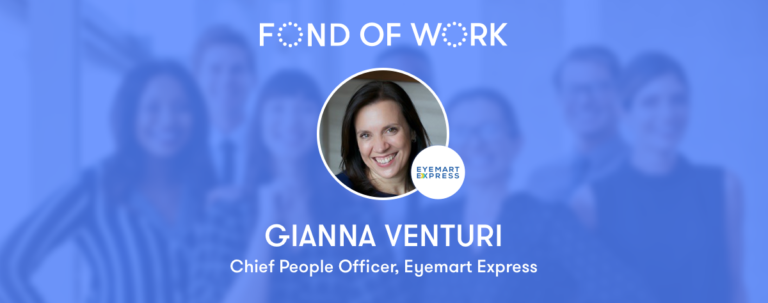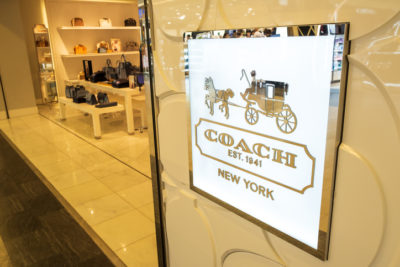
This time for Fond of Work, we interviewed Gianna Venturi, Chief People Officer at Eyemart Express. Gianna is a successful HR leader with extensive experience in global markets. Gianna is known for bringing a dynamic strength to her role, enhanced by strong relationships across internal and external customers, and across cultures, geographies and disciplines. She graduated with a Global Executive MBA from Duke University’s Fuqua School of Business.
How did you first get into the HR space?
I was born and raised in South Africa, and the HR space was pretty big there because of the country’s history. We see a lot of labor legislation in South Africa, and that drives the whole profession. For me, it was finding a space between the balance of the people side of things — psychology and human behavior — as well as all the analytics that come with HR.
 My degree included majoring in Industrial Psychology, and it was focused on organizational psychology. Obviously, we didn’t become psychologists, but we did spend three years in psychology classes, studying the way people behave at work, how to motivate them, and how to engage them. We also studied statistics, and it was fascinating to put those two together for me.
My degree included majoring in Industrial Psychology, and it was focused on organizational psychology. Obviously, we didn’t become psychologists, but we did spend three years in psychology classes, studying the way people behave at work, how to motivate them, and how to engage them. We also studied statistics, and it was fascinating to put those two together for me.
How did you make your way into your current position at Eyemart Express?
After I studied HR in South Africa, I started working for a recruiting company as a recruiter. That was my first role, and then I moved with that recruiting company into the headquarters to actually start up the HR function. Then, I decided to get into corporate HR and joined Kimberly-Clark. I started in the most junior role in HR of Kimberly-Clark and had an incredibly amazing career with them over 16 years and three continents.
 I worked my way up to being in my last role with Kimberly-Clark in the strategy office leading a global project. But before that, my biggest role was the head of HR for the Middle East, Eastern Europe, and Africa. After 16 years, it was time for me to test my skills, knowledge, and experience in another industry. I joined Coach, which took me to New York City. It was a fascinating transition because having grown up in a small little town in South Africa, NYC was very, very different for me, and a great test!
I worked my way up to being in my last role with Kimberly-Clark in the strategy office leading a global project. But before that, my biggest role was the head of HR for the Middle East, Eastern Europe, and Africa. After 16 years, it was time for me to test my skills, knowledge, and experience in another industry. I joined Coach, which took me to New York City. It was a fascinating transition because having grown up in a small little town in South Africa, NYC was very, very different for me, and a great test!
It was great career growth for me to go to Coach and to understand the retail industry. Eventually, I wanted to be a head of HR, and the position at Eyemart Express came up. Obviously, it’s still retail, but it was private equity owned, in specialty retail and much smaller compared to what I was used to.
 I was used to companies with tens of thousands employees and that were close to or over 100 years old, spanning multiple countries, and here was Eyemart Express: 26 years old, domestic to the US and family-owned, up until private equity bought it.
I was used to companies with tens of thousands employees and that were close to or over 100 years old, spanning multiple countries, and here was Eyemart Express: 26 years old, domestic to the US and family-owned, up until private equity bought it.
The shift for me to Eyemart Express was a couple of things: one was getting the private equity experience — so being in an environment where you have owners that have a different operating model to public companies, which is what I was used to. And then the second was getting into a smaller environment to test whether I would like that or not. You have fewer resources and you’re the operator and the strategist. You’re rolling up your sleeves and doing the work and creating the vision. I believed I would enjoy that because I had done it in most of my previous roles outside of the USA.
There was also an amazing culture that attracted me to Eyemart Express. I had a combination of retail, fashion, health care, private equity, and fast growth. Fast growth is almost an opportunity that’s unheard of in the retail space at the moment. And this was the first time that we were getting a Chief People Officer, so I had a blank canvas to work with! It was all the right ingredients for me.
Why are you fond of your work?
I’m fond of my work for so many reasons. I love that Eyemart Express is still run like a family-owned business. Our culture is warm, caring, entrepreneurial and scrappy. Being able to have an impact on all associates across the company who work hard and succeed is great. As Chief People Officer, I lead building strategies, plans and tools for helping people grow and develop, as well as to continue to build on our great culture. Being able to actually see your fingerprints on those things and see the impact you make is really fulfilling.
 I also love the fact that it’s taught me so much about what it’s like to live and work in the US. Since I was previously working at big global companies, I didn’t know a lot about small domestic businesses in America and how they work. Eyemart Express is by no means a small business, but it operates like a family-owned business, and is very geographically dispersed mainly through smaller towns in the US. It’s a humbling experience to understand what rural America wants and needs. I have a better understanding of what life is like for the majority of our associates and I’m learning about the culture of small towns. It’s great to travel to tons of places in the middle of nowhere and get to know the people that work for this great company. Plus, I love traveling — it’s an intellectual curiosity and I love learning about people in different cultures and lifestyles. It’s been very rewarding and humbling.
I also love the fact that it’s taught me so much about what it’s like to live and work in the US. Since I was previously working at big global companies, I didn’t know a lot about small domestic businesses in America and how they work. Eyemart Express is by no means a small business, but it operates like a family-owned business, and is very geographically dispersed mainly through smaller towns in the US. It’s a humbling experience to understand what rural America wants and needs. I have a better understanding of what life is like for the majority of our associates and I’m learning about the culture of small towns. It’s great to travel to tons of places in the middle of nowhere and get to know the people that work for this great company. Plus, I love traveling — it’s an intellectual curiosity and I love learning about people in different cultures and lifestyles. It’s been very rewarding and humbling.
One of my most fascinating experiences with learning about culture was during a global role I had responsibility for both Israel and Saudi Arabia. They can’t even pick up the phone to call each other — those two countries essentially don’t exist to each other. Learning how to manage them and understanding the diversity of these countries helped me prepare for the diversity that the US also has to offer.
Why do you think HR is an important department for all businesses to have?
You can see it clearly with all the research that’s coming out. It doesn’t matter what you’re selling, ultimately. What matters is your people. They are the ones who create an amazing customer experience. Any company can create the same product or service, but what really sets you apart are your people.

Every business needs a CEO that understands and appreciates talent. You have to make sure your employees are at the center of your business, otherwise you won’t have the tools to build the product and culture you need. A lot of successful businesses see a direct correlation between how happy their employees are and how happy their customers are. It’s such a simple philosophy but it’s so true: from how you recruit and train employees to how you engage them every day (and even how you exit them if needed), you should always pay close attention to the way you treat your people, their engagement and morale overall.
What’s your management philosophy, and how do you apply it at Eyemart Express?
My personal philosophy is transparency and honesty, all the time. I also believe in stretching people — I’m notorious for stretching my team members past what they thought they could do. I am very passionate about helping make people employable anywhere, not just at the company we work for now. One thing I cannot guarantee is a job for life, so helping people become more and more employable is important to me personally.
 I deal with my team by being as open and honest as possible, even when it is tough news I need to share. I think being as direct as you can while still staying professional is the best way to help people grow. I always feel like people do better when they know the truth, rather than a discussion happening behind their backs. Just treat people with respect and dignity.
I deal with my team by being as open and honest as possible, even when it is tough news I need to share. I think being as direct as you can while still staying professional is the best way to help people grow. I always feel like people do better when they know the truth, rather than a discussion happening behind their backs. Just treat people with respect and dignity.
How do you reward and recognize your employees?
We’re a retail environment, so we host a lot of competitions, which is a really great way to motivate and reward people. It could be anything from giving away gift cards to our annual awards ceremony. People gather together and we celebrate our successes. We also have an “All Star of the Month” where anybody can nominate another person to be the star of the month and tell us why they deserve it. They get recognized in public and they get some small gifts.
 Things like that are a big deal for people. You can put a photo on the wall and highlight an employee of the month, but it means a lot when it comes directly from the CEO and the Leadership team, or even your coworkers themselves. We also have rewards for our learning platform. Employees earn points when they complete their training and can redeem things in our associate online store — a store just for them, with swag, gift cards, and other great prizes.
Things like that are a big deal for people. You can put a photo on the wall and highlight an employee of the month, but it means a lot when it comes directly from the CEO and the Leadership team, or even your coworkers themselves. We also have rewards for our learning platform. Employees earn points when they complete their training and can redeem things in our associate online store — a store just for them, with swag, gift cards, and other great prizes.
My personal philosophy with my team is that you must always make sure people feel appreciated. Obviously, we try to do this with everyone as well (not just my team), but I put special attention into making sure my team is appreciated for the extra effort they put in every day. For example, we implemented a new HRIS system last year and we had lots of late nights and exhausted people. It’s in those moments of stress when I make sure the rest of the Leadership team is recognizing their efforts, and that everyone in the HR team, no matter their role or level, is helping the team in whichever way we can. In those times, we all learned how to validate a level of data I would not have imagined before!
Demonstrating that we’re all one team is very important — it doesn’t matter what my title is (or anyone else’s for that matter). What matters is the work we all do, and recognizing people for that extra work is so valuable. Whether they want to take time off or take a day to work from home so they can spend more time with their kids, it’s important to recognize them. A thank you card, gift cards, or even taking them out to lunch, or bringing breakfast or dessert in for everyone works.
 For a lot of employees, public recognition is the most effective. I’ll make sure that the CEO appreciates employees for resolving challenges or saving the company money. The CEO and the Leadership team can send them a congratulatory email or pop by their desk. It’s pretty awesome when the CEO becomes a part of the recognition process.
For a lot of employees, public recognition is the most effective. I’ll make sure that the CEO appreciates employees for resolving challenges or saving the company money. The CEO and the Leadership team can send them a congratulatory email or pop by their desk. It’s pretty awesome when the CEO becomes a part of the recognition process.
Why do you think recognition matters in the workplace?
It’s not even just in the workplace. People thrive on positive feedback. Generally, people do better when they’re hearing about the things that they’re doing right, no matter if it is personally or professionally. It’s normal human behavior, and very few people are motivated by the stick. You need to be able to offer constructive feedback too, but focusing on all the things the person does well is important. I think employee recognition goes a long way to drive a positive culture which, in turn, drives business results. It’s as simple as that.
 You have to manage your recognition well, though. If you overdo it, people start to tune out and recognition becomes irrelevant. But when you’re actually managing it, like on the Fond platform, you can keep tabs and have more control.
You have to manage your recognition well, though. If you overdo it, people start to tune out and recognition becomes irrelevant. But when you’re actually managing it, like on the Fond platform, you can keep tabs and have more control.
What’s the best advice you’ve received in your career?
The best advice that I received was pretty early on in my career. I had just started managing people, and I was dealing with a really tough situation with a team member. It was very upsetting, and I was sitting in my boss’s office thinking about everything that had happened.
 He said to me, ”If you want to continue growing your career, you’re going to need to make decisions. And when you make decisions, you’re going to make mistakes. If you don’t make mistakes, then you’re never going to move forward. You could stay in one job and not grow, but if you want to grow, you’re gonna have to do something wrong. In fact, it’s important that you do that because it’s a critical part of your growth.”
He said to me, ”If you want to continue growing your career, you’re going to need to make decisions. And when you make decisions, you’re going to make mistakes. If you don’t make mistakes, then you’re never going to move forward. You could stay in one job and not grow, but if you want to grow, you’re gonna have to do something wrong. In fact, it’s important that you do that because it’s a critical part of your growth.”
That has always stuck in my mind because I don’t like making mistakes. I’m a little bit of a perfectionist, so I feel a lot of discomfort with mistakes, but that’s also part of management. I’ve tried to insert that sentiment into my management philosophy because I want to give my team the space to make mistakes. If they’re not making mistakes, I’m not stretching them enough. That piece of advice is always top-of-mind for me.
What are some of the most pressing issues HR leaders face today?
Right now, unemployment rates are at the lowest they’ve been in a long time. This means employees have lots of choices. You have to hang onto your employees — they’re not commodities. We’re in a very hot market for our associates, and we’re just not big enough to compete with all the extra benefits they would get at the large global companies.
 The thing that keeps me up at night is making sure that we have the right environment, check in on the right people, and engage them to keep them. And it’s not going to be just compensation — it’s going to be everything else, like recognition and perks. How do I make sure we have the kind of environment where people are engaged and want to learn and grow? I think that’s a big thing most HR leaders are struggling with wherever you’re based in the country.
The thing that keeps me up at night is making sure that we have the right environment, check in on the right people, and engage them to keep them. And it’s not going to be just compensation — it’s going to be everything else, like recognition and perks. How do I make sure we have the kind of environment where people are engaged and want to learn and grow? I think that’s a big thing most HR leaders are struggling with wherever you’re based in the country.
And then there’s all the talk about AI and AI taking over current roles. For me, it’s about being aware of that and making sure you’re wearing a lot of different hats. You have to be nimble, open minded, agile, and ready to grow your skills. Who knows where the world is going to go next.
What’s one thing you’ve learned the hard way in your career?
One thing I can think of is that when you have extremely talented people working for you, that doesn’t mean they just get a free pass. You know how you have someone completely brilliant? They’re really smart and they have a great worth ethic and it’s delivering amazing results? In this example, this person was really sensitive as well, so any bit of feedback, whether it came from me or someone else, sent them into a spiral.
 I learned the hard way that I needed to still give that feedback and help this person learn how to accept feedback and grow from it, rather than just not give the feedback at all. That was tough, because you don’t want to upset someone whose brilliance is delivering amazing results for you and you want to keep them motivated, but they also need to receive feedback just like everyone else.
I learned the hard way that I needed to still give that feedback and help this person learn how to accept feedback and grow from it, rather than just not give the feedback at all. That was tough, because you don’t want to upset someone whose brilliance is delivering amazing results for you and you want to keep them motivated, but they also need to receive feedback just like everyone else.
Any advice for future HR leaders?
My biggest piece of advice is to be a business leader first. The drivers of the business understand what keeps your CEO up at night and then build strategies around resolving that. Don’t be the HR professional that says, “Hey, I’ve got a really cool tool that I’ve used before in previous companies and I’m going to fit it into this company and it’s going to work.” If the business doesn’t need it, it’s not relevant.
 So, be a business leader first,and always speak as a business leader with other business leaders. You’re just wearing the HR hat, like the business leader of finance is wearing the finance hat. You’re still a critical leader, and it’s important to understand pain points, the financials and the other intricacies of the business. You need to get comfortable with the numbers, data and analytics first and foremost to be successful these days.
So, be a business leader first,and always speak as a business leader with other business leaders. You’re just wearing the HR hat, like the business leader of finance is wearing the finance hat. You’re still a critical leader, and it’s important to understand pain points, the financials and the other intricacies of the business. You need to get comfortable with the numbers, data and analytics first and foremost to be successful these days.
Thanks so much to Gianna for taking the time to speak with us! Eyemart Express is hiring, so check out their website to learn more. And, of course, stay tuned for the next interview in the Fond of Work series!
Fond is a global SaaS platform that seamlessly consolidates employee rewards and recognition processes into one easy-to-use solution. For more information on how Fond can help you, request a demo today!
